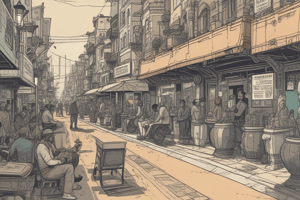Podcast
Questions and Answers
What is a significant challenge faced by India's political system?
What is a significant challenge faced by India's political system?
- Diversity among its population (correct)
- Lack of public participation in elections
- High levels of public trust in government
- Homogeneity in party ideologies
Which of the following factors significantly influences India's foreign policy?
Which of the following factors significantly influences India's foreign policy?
- Historical conflicts with neighboring countries
- Religious affiliations of the ruling party
- Economic influence and international relations (correct)
- Cultural beliefs of the majority population
What social issue persists in India, requiring continual attention?
What social issue persists in India, requiring continual attention?
- Gender inequality (correct)
- Economic stability across all regions
- Homogeneous income distribution
- Universal literacy rates
How have regional political parties affected India's political landscape?
How have regional political parties affected India's political landscape?
Which of the following best represents a requirement for addressing social issues in India?
Which of the following best represents a requirement for addressing social issues in India?
Which statement accurately describes India's demographic landscape?
Which statement accurately describes India's demographic landscape?
What significant impact did British rule have on India?
What significant impact did British rule have on India?
Which geographical feature forms a significant northern boundary of India?
Which geographical feature forms a significant northern boundary of India?
What characterizes the Indian economy's structure?
What characterizes the Indian economy's structure?
Which of the following statements about India's cultural heritage is correct?
Which of the following statements about India's cultural heritage is correct?
Which region of India is most significantly affected by monsoon seasons?
Which region of India is most significantly affected by monsoon seasons?
How did the Indus Valley Civilization contribute to India's history?
How did the Indus Valley Civilization contribute to India's history?
What role do rivers such as the Ganges and Indus play in India?
What role do rivers such as the Ganges and Indus play in India?
What defines India's contemporary role in global matters?
What defines India's contemporary role in global matters?
Flashcards
India's political system
India's political system
India's government system is a mix of federalism and democracy where the people choose their leaders through elections.
Challenges in India's political system
Challenges in India's political system
India's diverse society presents challenges for its political landscape, but elections are vital for its democratic process.
Social issues in India
Social issues in India
India faces many social problems like poverty, inequality, and discrimination, highlighting the need for ongoing efforts to address them.
India's role in international relations
India's role in international relations
Signup and view all the flashcards
Balancing Act in India's Foreign Policy
Balancing Act in India's Foreign Policy
Signup and view all the flashcards
Indus Valley Civilization
Indus Valley Civilization
Signup and view all the flashcards
Buddhism
Buddhism
Signup and view all the flashcards
Himalayas
Himalayas
Signup and view all the flashcards
Monsoons
Monsoons
Signup and view all the flashcards
Ganges River
Ganges River
Signup and view all the flashcards
Population Growth
Population Growth
Signup and view all the flashcards
Cultural Heritage
Cultural Heritage
Signup and view all the flashcards
Indian Economy
Indian Economy
Signup and view all the flashcards
Study Notes
Introduction to India
- India is a large, diverse country with a rich history and culture.
- It is a prominent player in global politics and economics.
- India's population is vast and diverse, with various ethnic groups, religions, and languages.
- The country is geographically varied, ranging from mountains to deserts to coastal plains.
- Understanding India involves considering its complex history, diverse society, and its contemporary role in the world.
History of India
- The Indus Valley Civilization, one of the world's earliest urban cultures, thrived in the northwest of India.
- Ancient India saw the development of major religions like Hinduism and Buddhism.
- The region was influenced by various empires and civilizations, including the Mauryan, Mughal, and British empires.
- British rule significantly impacted India's political and economic landscape, eventually leading to independence.
- Post-independence, India developed a socialist-leaning economy.
Geography of India
- India is a diverse country geographically, varying from high mountains to plains and deserts.
- The Himalayas form a significant northern boundary.
- The Indian subcontinent's climate varies greatly across different regions.
- Coastal regions experience monsoons, which are a vital part of the agricultural cycle.
- Rivers like the Ganges, Indus, and Brahmaputra are crucial for various aspects of life in the nation.
Economy of India
- India has a rapidly growing economy, playing a significant role in global trade.
- India shows a mix of a large organized sector and a large unorganized sector.
- The Indian service sector has shown significant growth.
- Technological advancements and innovations are driving economic development.
- Significant disparities in wealth distribution still exist.
Demographics of India
- India has a large and diverse population.
- India experiences high rates of population growth.
- The country is home to various ethnic groups and religions.
- The demographic composition is evolving rapidly.
- India's demographic profile significantly impacts economic and social policies.
Culture of India
- India has a rich and varied cultural heritage.
- India's diverse cultural practices are reflected in art, architecture, music, literature, dance, and traditions.
- Celebrations are integral to many Indian cultures.
- Religion plays a significant role in shaping India's cultural and social norms.
- Different religions and cultural groups often interact and influence each other.
Politics of India
- India is a democratic republic, with a federal structure of governance.
- India’s political system has faced challenges due to its diversity.
- India's political parties represent a wide range of ideologies.
- Elections are a crucial part of the democratic process.
- The rise of regional political parties has significantly changed the political landscape.
Social Issues in India
- India faces various social issues including poverty, inequality, and social discrimination.
- Access to education and healthcare remains a challenge for some segments of the population.
- Issues related to gender inequality and social discrimination need constant attention.
- India engages in continual effort to address these challenges.
International Relations
- India plays an important role in global affairs, especially in the context of increasing economic influence.
- India's international trade relations are complex and multifaceted.
- India maintains relations with numerous countries and participates in various international organizations.
- India's foreign policy is influenced by various factors, and there is a delicate balancing act in international relations.
Studying That Suits You
Use AI to generate personalized quizzes and flashcards to suit your learning preferences.




